
Loose parts are such a valuable resource in a learning environment; they are versatile, open-ended, and can be used in every area of learning. The children in my setting know they can move them and use them in any way and any area they wish, and part of them knowing and doing this is because I model this to them in the way I use the loose parts in activities.
Loose parts are the perfect resource for maths activities; counting, pattern, size, shape, measure, and capacity – they can be used to practise and embed any maths skill the children have been focusing on. With ever-diminishing budgets, it is important we find ways to keep a fully stocked enabling environment for our children, as well as considering the sustainability of our settings. I have not thrown out any plastic resources, and I do offer them alongside the natural, free or inexpensive resources I have, but as we continue to develop our settings, it is important to think carefully about the resources we use.
Here are some ideas of how to use loose parts in maths.
1. In the frame
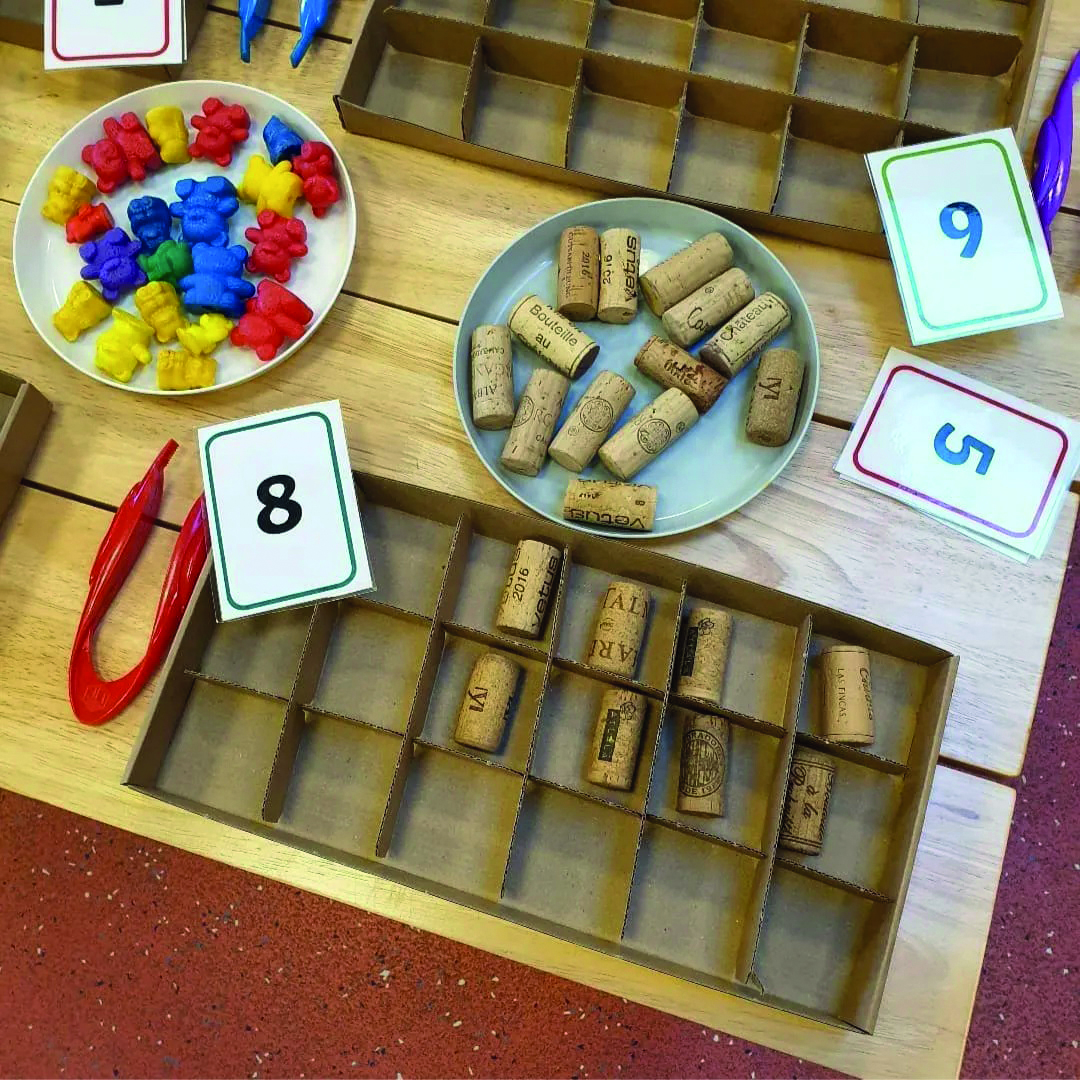 This is a great activity to develop fine motor skills as well as number skills. The children pick a numeral card and then use the tweezers to move the objects into the frame, matching the number shown on the card. The frames in the photo above were packaging from a shop – you can also use chocolate packaging or cupcake tins!
This is a great activity to develop fine motor skills as well as number skills. The children pick a numeral card and then use the tweezers to move the objects into the frame, matching the number shown on the card. The frames in the photo above were packaging from a shop – you can also use chocolate packaging or cupcake tins!
2. Measuring sticks
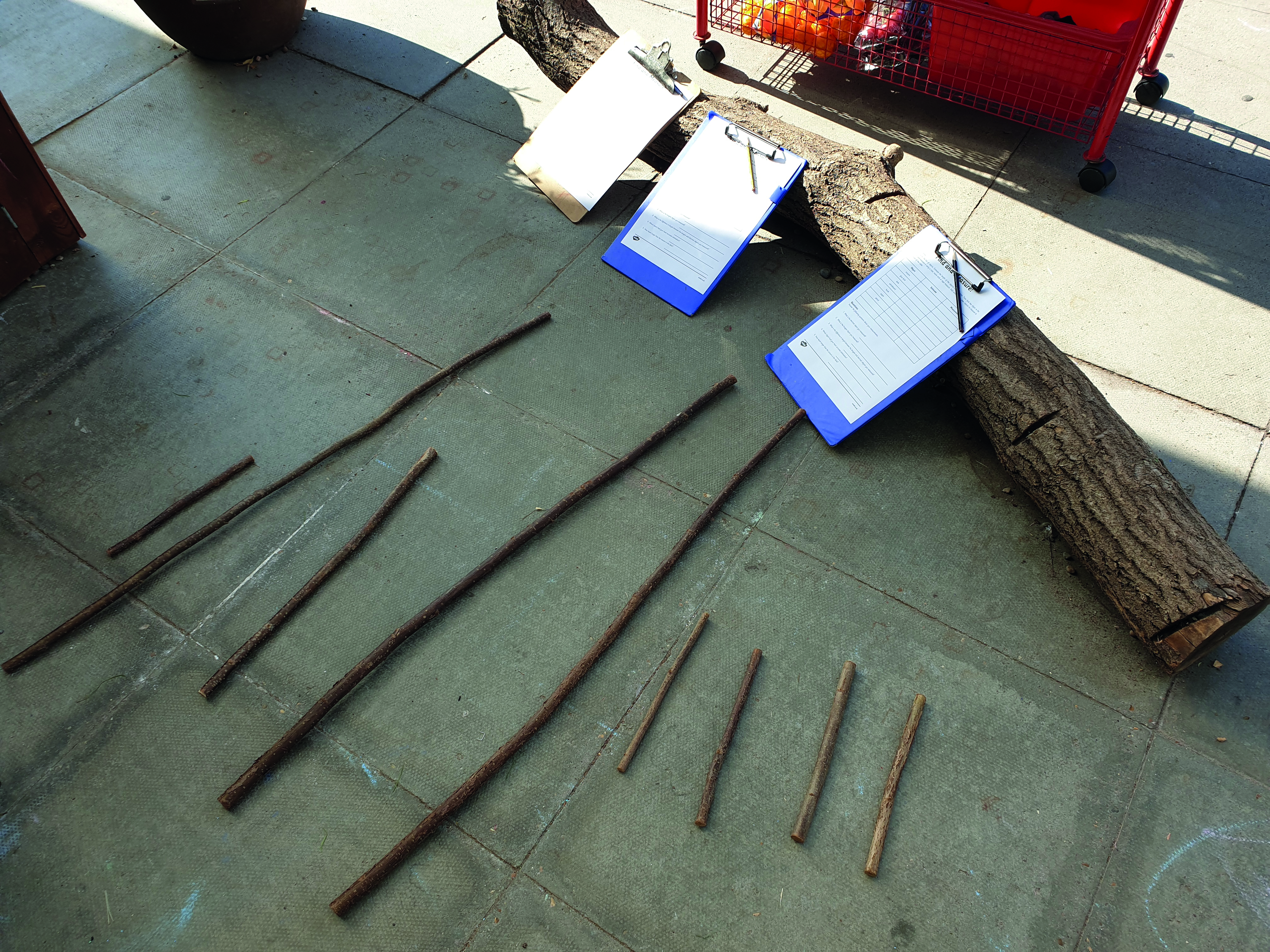 Encourage your families to get involved in adding to your loose-parts stock. Each child was asked to bring in a stick, and they were then used in this set-up. The children could order these sticks from shortest to longest, measure them using standard or non-standard units, or categorise them into short, medium and long.
Encourage your families to get involved in adding to your loose-parts stock. Each child was asked to bring in a stick, and they were then used in this set-up. The children could order these sticks from shortest to longest, measure them using standard or non-standard units, or categorise them into short, medium and long.
3. Matching and counting
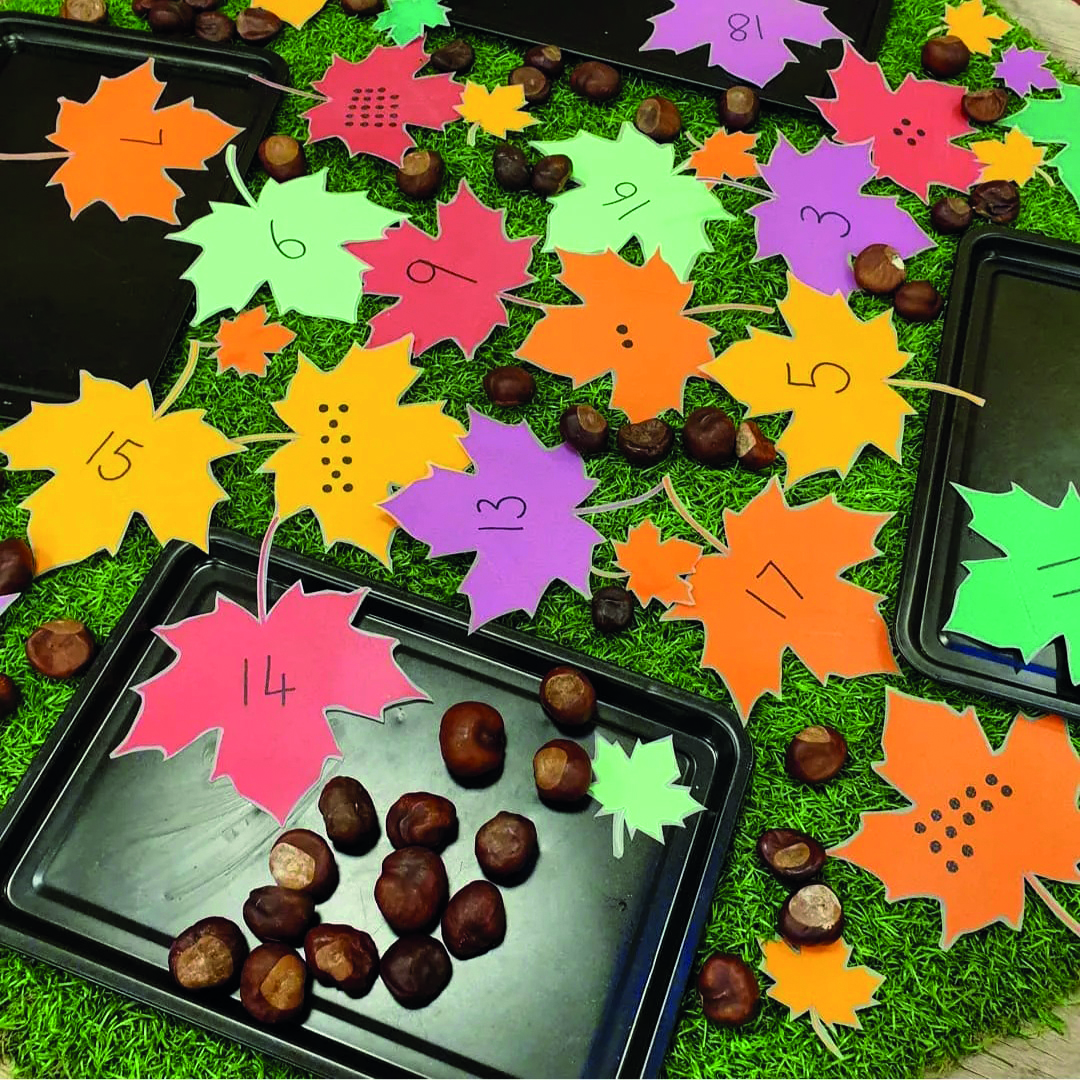 This very simple invitation can be differentiated through outcome or adult intervention. Children can start independently, matching quantities to numerals, practising 1:1 counting. With some prompting from adults, they can explore doubling and halving, or sharing. Practitioners could also challenge the children by exploring addition and subtraction.
This very simple invitation can be differentiated through outcome or adult intervention. Children can start independently, matching quantities to numerals, practising 1:1 counting. With some prompting from adults, they can explore doubling and halving, or sharing. Practitioners could also challenge the children by exploring addition and subtraction.
4. Number sentences
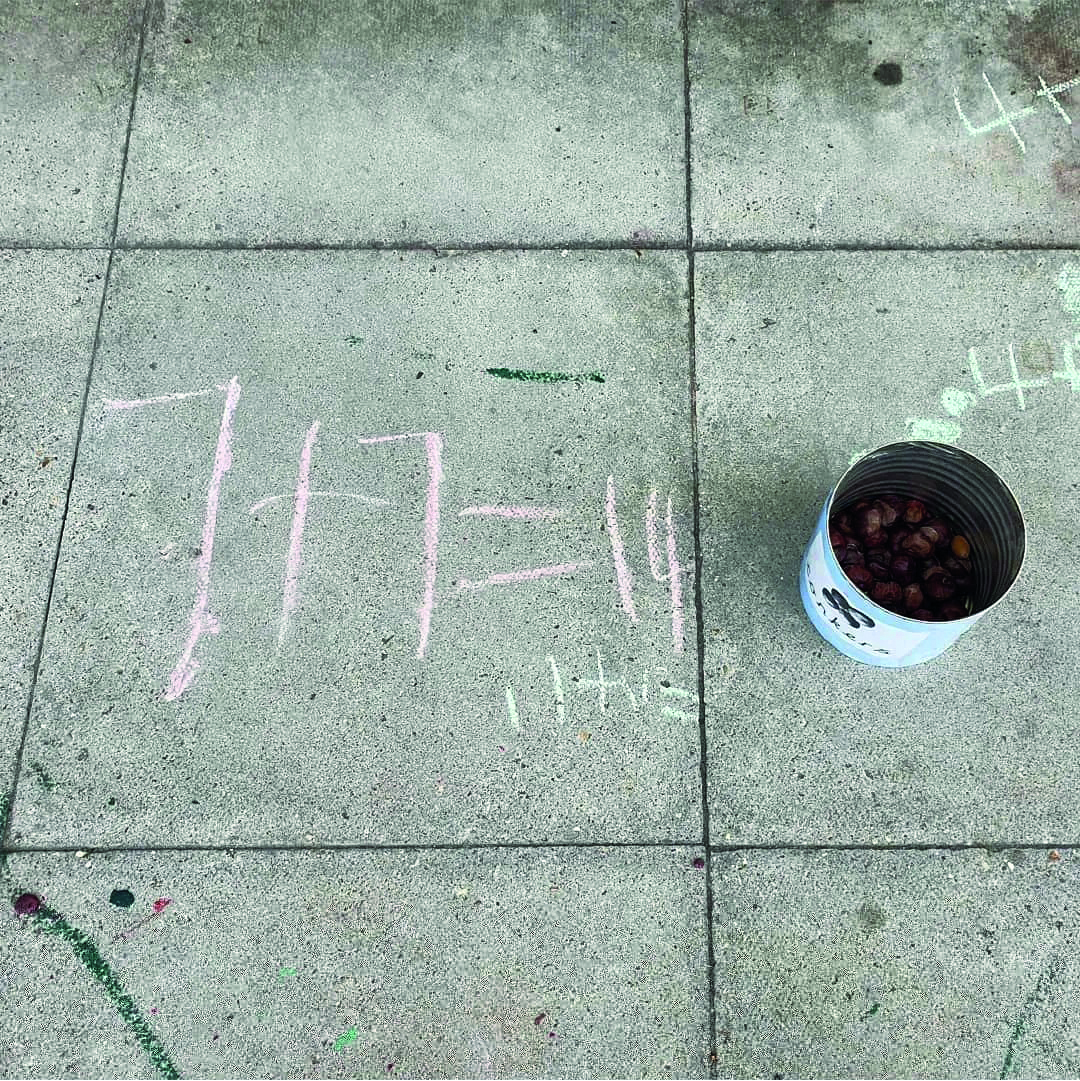 This activity encompasses motor skills, recording maths, and loose parts. This costs next to nothing to set up and provides hours of learning. All you need is chalk and your outdoor loose parts (or bring your indoor loose parts outside). This was child-initiated but was then extended by an adult. The child wrote this number sentence on the ground and matched the quantities to find the total. The practitioner then played alongside the child, challenging them in their learning as well as encouraging other children to join in. This activity can be adapted for subtraction, part-part-whole, sets, and doubling and halving.
This activity encompasses motor skills, recording maths, and loose parts. This costs next to nothing to set up and provides hours of learning. All you need is chalk and your outdoor loose parts (or bring your indoor loose parts outside). This was child-initiated but was then extended by an adult. The child wrote this number sentence on the ground and matched the quantities to find the total. The practitioner then played alongside the child, challenging them in their learning as well as encouraging other children to join in. This activity can be adapted for subtraction, part-part-whole, sets, and doubling and halving.
5. Invitation to play
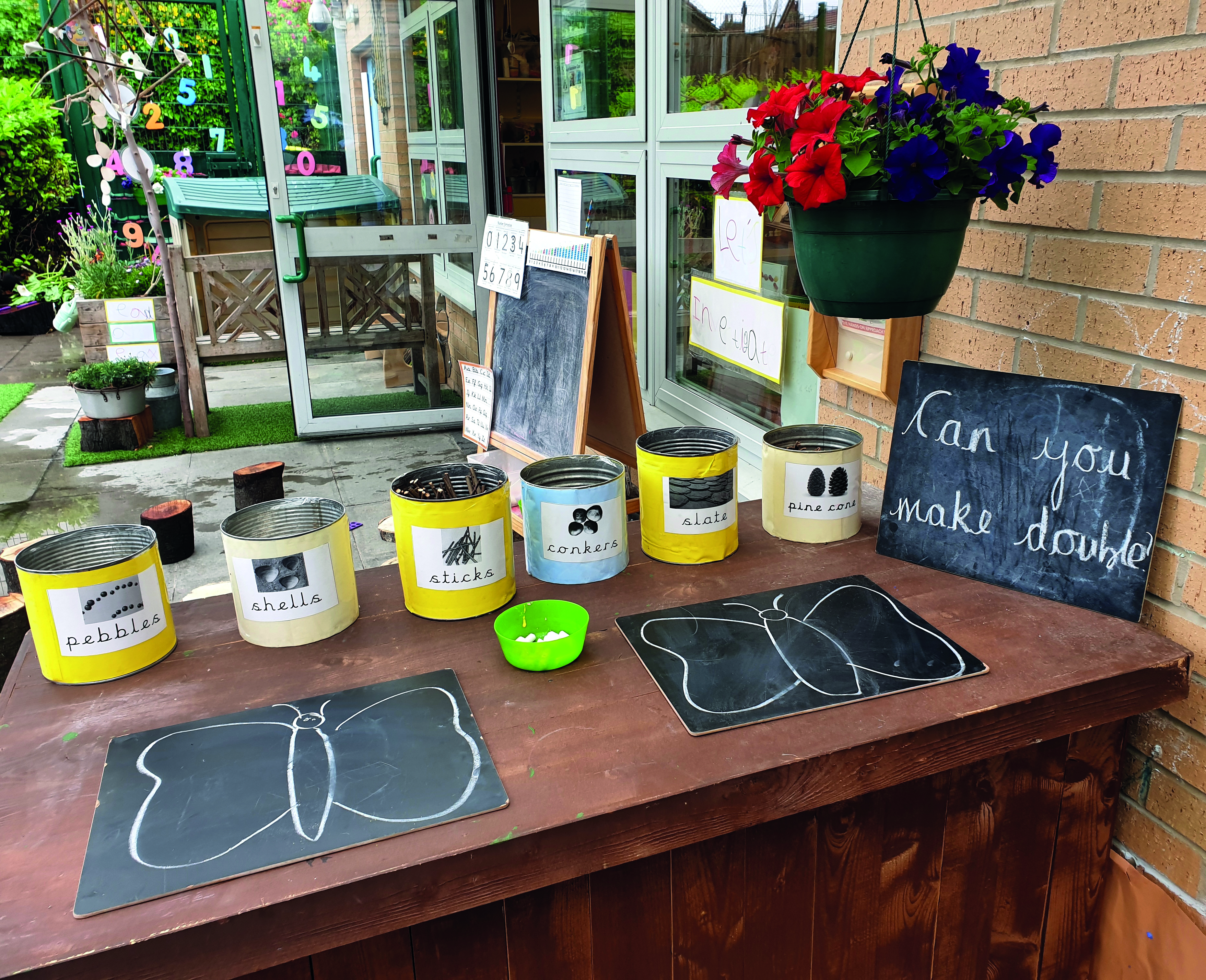 This invitation to play took less than two minutes to set up using chalk, chalkboards and our outdoor loose parts. We had been teaching the children about doubling, and this activity was set up so the children could embed the skills we had taught.
This invitation to play took less than two minutes to set up using chalk, chalkboards and our outdoor loose parts. We had been teaching the children about doubling, and this activity was set up so the children could embed the skills we had taught.
6. Labelling shapes
 After exploring shapes during our main teaching sessions, the children were invited to make shapes using loose parts in the outdoor classroom. We offered 2D shapes to prompt the children and a selection of loose parts. Once the children had made their shape, we challenged them to label their shape. This challenge was differentiated – the children could label their shape using the initial or dominant sounds, or could label their shape with how many sides and corners it had.
After exploring shapes during our main teaching sessions, the children were invited to make shapes using loose parts in the outdoor classroom. We offered 2D shapes to prompt the children and a selection of loose parts. Once the children had made their shape, we challenged them to label their shape. This challenge was differentiated – the children could label their shape using the initial or dominant sounds, or could label their shape with how many sides and corners it had.
Shardi Vaziri is the assistant head teacher at Tottenhall Infant School in Enfield, North London and an educational consultant specialising in loose parts and sustainable provision. Contact her at: earlyyearsonashoestring@gmail.com.









